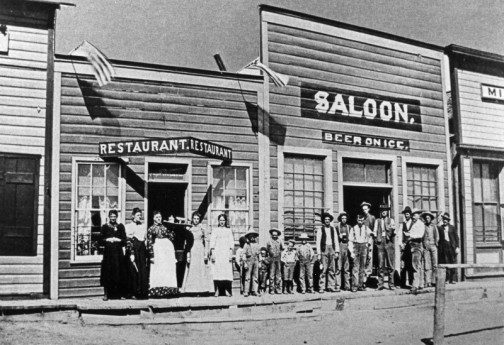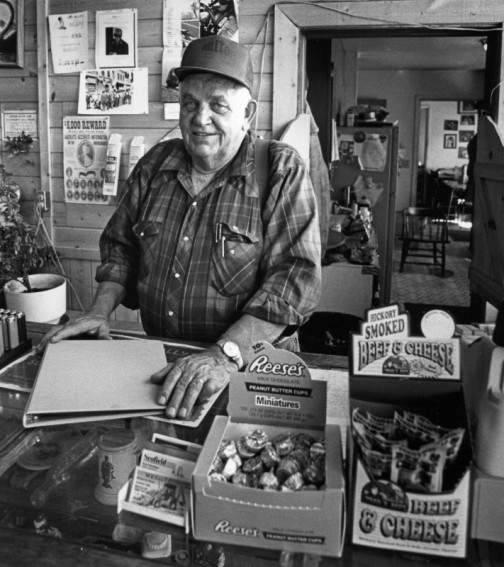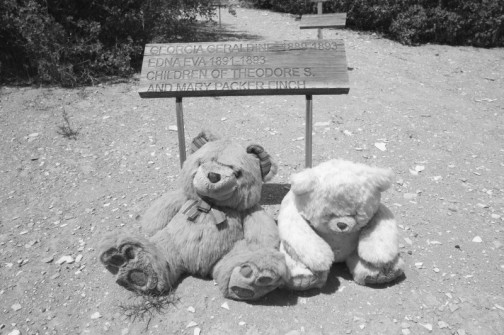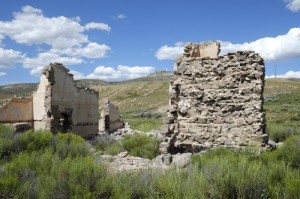Nowadays it’s just an open road that runs through two canyons and over a mountain range, with one roadside rest stop along the way and a single gas station at Soldier Summit. However, there was a time not so very long ago when there were settlements all along U.S. 6. People lived, worked, played, raised families, soaked in natural hot springs and even danced in caves. Those were the days, but you’d be hard pressed to find even a trace of such settlements today.
At the west end is Utah Valley, where my parents came of age. To the east is Castle Valley, where I grew up. Because we lived in Price and my grandparents in Provo, we made the trip “over the mountain” many, many times—in a 1950 Mercury that was always on the verge of becoming vapor locked. As we sputtered along, Dad would entertain us with tales of his youth, of hauling fresh vegetables from Payson to Scofield in a horse-drawn wagon beside his uncle Lou. Mom would point out the cave in Thistle where her father had courted my maternal grandmother just after he returned from fighting in the Spanish-American War. We’d pass what little remains of Colton, where my maternal grandparents had “honeymooned” in 1908.
By the time I came along, all that remained of Colton was the Hill Top Tavern, in front of which stood a billboard advertising Clabber Girl Baking Powder. I had no idea what a clabber girl might be, but her reputation was forever tarnished, thanks to the proximity of that billboard to the Hill Top Tavern.
A few years ago I decided it was time to investigate. The establishment, renamed Hill Top Service, was then owned by a man named Dennis Finch—last in a long line of Finches who had called the area home. Dennis told me he was keeping the place open mostly out of respect for his late mother, who, wheelchair-bound, would park herself just inside the entrance, where she would greet everyone who came in the door.
“My mother named it the Hill Top Tavern. She had a tavern and café here. When they passed all them laws, she couldn’t afford to buy a license. They wanted a hundred and fifty thousand, plus ten thousand for a state license.
“She spent her whole life right here on the hill. She didn’t want to have anything to do with going to the valley, rest home or anything else. One thing she was afraid of was being put in a rest home.”
Dennis has since passed on and the Hill Top Service is shuttered. In time it will vanish from the earth, same as Tucker, Thistle, Castilla Springs and Galoolie, a railroad stop that once numbered 250 souls. Today, all that remains of Galoolie is a cemetery, lovingly maintained by the Atwood, Chadwick and Elliott families. Like every other village along the route, Galoolie got its start as a railroad whistle stop. In the Nineteen Fifties, Galoolie had enjoyed a brief moment of fame when it was cited in Ripley’s “Believe It Or Not.” Believe it or not, in order for a train to summit the Wasatch Plateau, it must pass Galoolie eleven times! Now, that doesn’t mean that you could stand beside the tracks and watch the same train go by eleven times. What it means is, if you had really good eyesight, you could watch as the train wended its way uphill via a series of ascending switchbacks. You could wave at the engineer each time the train “passed,” but I very much doubt he’d wave back.
In the graveyard I was touched by the presence of teddy bears marking the final resting place of Georgia Geraldine, aged four, and Edna Eva Finch, aged two. Their mother Mary had brought the girls to Utah from Colorado in hopes they might not succumb to an epidemic of scarlet fever that was ravaging the pediatric population of Grand Junction. But it was too late, and their brief time on earth ran out in 1893.
Time also ran out for nine-year-old Myrtle Elliott, who was crushed beneath a 100-pound sack of grain. Then time ran out for Myrtle’s father, Edson William Elliott, crushed beneath an ore cart in the Castle Gate mine. According to an account in the Eastern Utah Advocate, “mine workers found Edson’s mangled body, his railroad pocket watch embedded in his cheek. The watch had stopped at the time of its owner’s death.”
Finally, time ran out for Viola Chadwick Ballard, who miraculously avoided being crushed beneath anything, only to be shot to death by her jealous husband Paris, who suspected his wife of having a crush on a fellow named Hill. Paris then turned the .38-caliber revolver on himself. Today the estranged couple lie side by side in an out-of-the-way ghost town graveyard, where bones will not be picked nor jumped, ever again.



